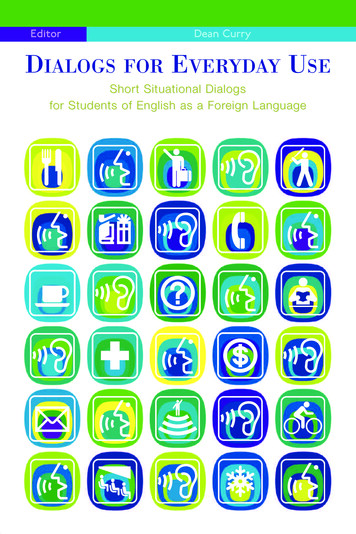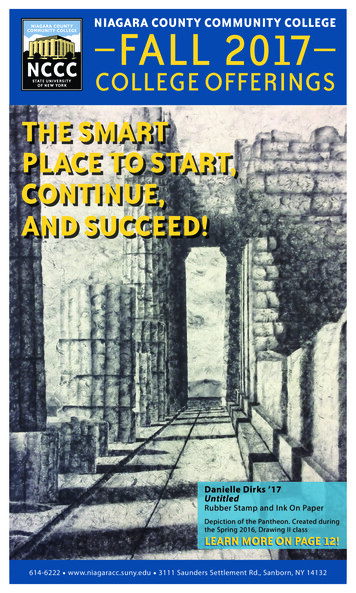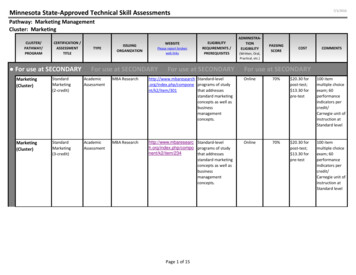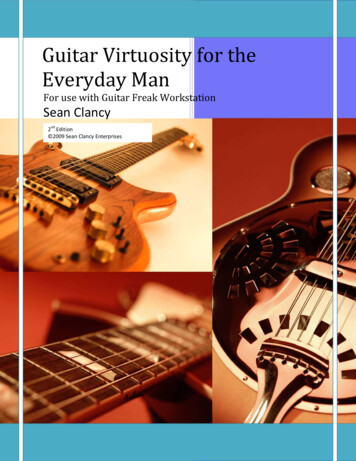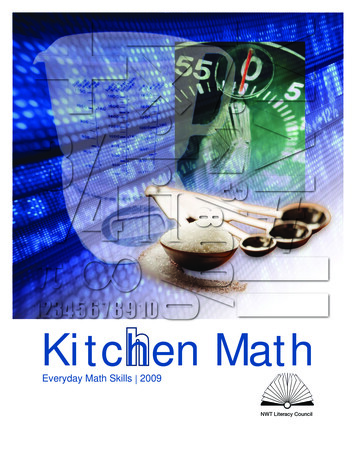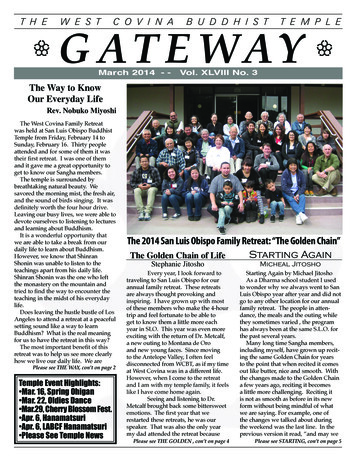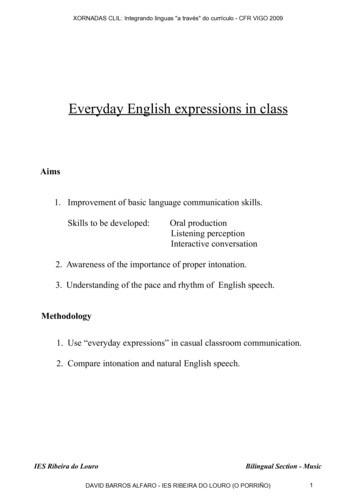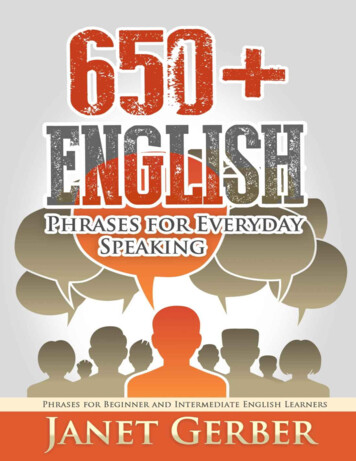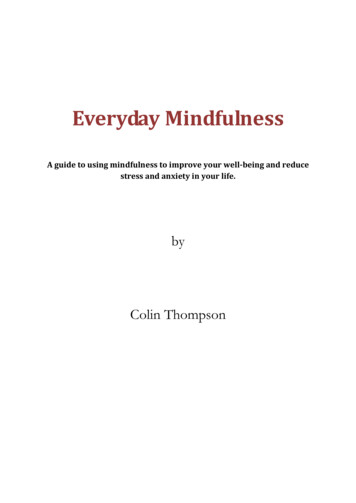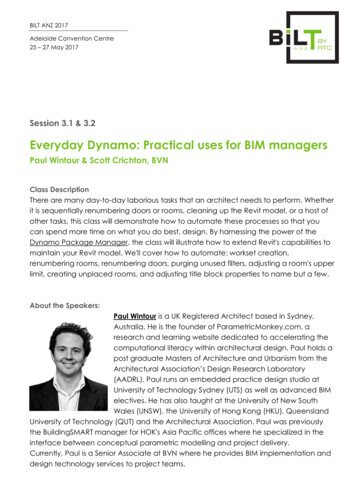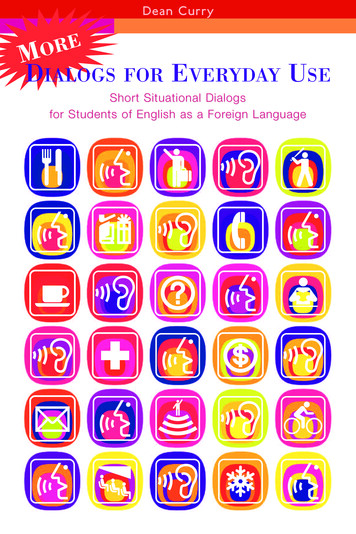
Transcription
Dean CurryREOMDIALOGS FOREVERYDAY USEShort Situational Dialogsfor Students of English as a Foreign Language
(11
EMORDIALOGS FOR EVERYDAY USEShort Situational Dialogsfor Students of English as a Foreign LanguageD EAN C URRY UNITED STATES DEPARTMENTOFSTATEOffice of English Language Programsi
DIALOG 1MORE DIALOGSFOR EVERYDAY USEShort Situational Dialogs for Students of English as a Foreign LanguageDean CurryFirst published in 1983Second printing 1997by the English Language Programs Divisionof the United States Information Agency,Washington, DC.This printing published in 2004by the Office of English Language Programsof the United States Department of State. United States Department of StateBureau of Educational and Cultural AffairsOffice of English Language ProgramsWashington, DC ing/ii
8192021222324252627282930313233343536Greetings . . . . . . . . . . . . . . . . . . . . . . . . . . . . . . . 1Early in the Morning . . . . . . . . . . . . . . . . . . . . . . 2Daily Needs . . . . . . . . . . . . . . . . . . . . . . . . . . . . . 3Airport Bus . . . . . . . . . . . . . . . . . . . . . . . . . . . . . 4Making a Date . . . . . . . . . . . . . . . . . . . . . . . . . . . 5Catching a Bus . . . . . . . . . . . . . . . . . . . . . . . . . . 6Ordering Breakfast . . . . . . . . . . . . . . . . . . . . . . . 7Near Accident . . . . . . . . . . . . . . . . . . . . . . . . . . . 8Arrival Time . . . . . . . . . . . . . . . . . . . . . . . . . . . . . 9After the Game . . . . . . . . . . . . . . . . . . . . . . . . . 10Going for a Walk . . . . . . . . . . . . . . . . . . . . . . . . 11What’s for Dinner? . . . . . . . . . . . . . . . . . . . . . . . 12Academy Awards . . . . . . . . . . . . . . . . . . . . . . . 13At the Hotel . . . . . . . . . . . . . . . . . . . . . . . . . . . . 14After the Movie . . . . . . . . . . . . . . . . . . . . . . . . . 15At the Bank . . . . . . . . . . . . . . . . . . . . . . . . . . . . 16Discussing a News Story . . . . . . . . . . . . . . . . . 17Talking It Over . . . . . . . . . . . . . . . . . . . . . . . . . . 18Weekend Plans . . . . . . . . . . . . . . . . . . . . . . . . . 19Dinner Invitation . . . . . . . . . . . . . . . . . . . . . . . . 20Car Insurance . . . . . . . . . . . . . . . . . . . . . . . . . . 21Parents’ Night Out . . . . . . . . . . . . . . . . . . . . . . 22Discussing the Economy . . . . . . . . . . . . . . . . . 23Dental Appointment (by phone) . . . . . . . . . . . 24Making Plans . . . . . . . . . . . . . . . . . . . . . . . . . . . 25Neighborhood Problem . . . . . . . . . . . . . . . . . . 26Car Theft . . . . . . . . . . . . . . . . . . . . . . . . . . . . . . 27Getting Ready . . . . . . . . . . . . . . . . . . . . . . . . . . 28Making a Purchase . . . . . . . . . . . . . . . . . . . . . 29Mail Time . . . . . . . . . . . . . . . . . . . . . . . . . . . . . . 30Bedtime . . . . . . . . . . . . . . . . . . . . . . . . . . . . . . . 31Getting Something Fixed . . . . . . . . . . . . . . . . . 32Family Plans . . . . . . . . . . . . . . . . . . . . . . . . . . . 33Planning a Business Trip . . . . . . . . . . . . . . . . . 34A Short Discussion . . . . . . . . . . . . . . . . . . . . . . 35Family Squabble . . . . . . . . . . . . . . . . . . . . . . . . 36iii
DIALOG 1FOREWORD he 36 dialogs in More Dialogs for Everyday Use are situation based;they present spoken American English in a naturalness of style thatwill help students of English as a Foreign Language gain practice inhearing and understanding the stream of speech. There is no estab lished order of difficulty in the arrangement of the dialogs within thetext, and teachers are encouraged to use them as needed to supple ment the more normal type of classroom learning activities.The Language Notes concentrate upon words and expressions thatare either colloquial or idiomatic in nature. The dialogs themselvesare kept short so that if teachers feel that memorization of the dialogscan be a part of the pedagogy of presentation, students will not haveto face a seemingly insurmountable task of memorizing long pas sages. Memorization is encouraged since it often helps to developboth listening and reading comprehension.Anaudiocassette is available with this booklet and is a necessarycomponent of the audio study unit.iv
DIALOG 1GreetingsA. (Acquaintances)Matt:Good morning.Maxine:Good morning. How are you today?Matt:Just fine, thanks. How are you?Maxine:Wonderful. Things couldn’t be better.B. (Good Friends)Dotty:Hi. What’s up?Vivian:Nothing much. What’s new with you?Dotty:Not too much. I’ve been pretty busy.Vivian:Me too. Seems like all I do is eat and sleep.Dotty:Gotta go. Call me tonight.Vivian:Okay. Check you later.C. (Family)Mother:Good morning.Son:Morning. What’s for breakfast?Mother:The usual. Eggs, toast, and cereal. Coffee, if you want.Son:I think I’ll just have cereal for a change.Mother:Help yourself. The cereal and sugar are on the table.The milk’s in the refrigerator.Language Notes Acquaintance a person one knows but not a close friend@ Things couldn’t be better Everything is going well. @ Hi informal way to say hello @ What’s up? What’s new? Used in formally.@ Pretty rather; somewhat @ Me too has meaningof I have been busy, too. @ Seems It seems @ Gotta I’ve gotto I must @ Check you later I’ll call you later. @ What’s forbreakfast? What are we having for breakfast? @ Just only@ Help yourself. Serve yourself.1
DIALOG 2Early in the MorningGene:It’s time to get up!Ed:I just went to bed!Gene:You shouldn’t have stayed up so late watching TV. I toldyou we had to get an early start.Ed:I know, but that movie was just too good to leave. I guessI’ll just have to pay the price and be sleepy.Gene:Do you want to eat breakfast here?Ed:No. Why don’t we just grab a bite at the coffee shop nextdoor?Gene:Okay by me.Language Notes 2TV television @ get an early start leave early in the morning@ just simply @ pay the price suffer the consequences @grab a bite (Informal) get something to eat @ coffee shop a type of restaurant @ Okay by me. It’s all right with me.
DIALOG 3Daily NeedsJudith:This is the last of the milk.Mother:I know. I intend to go to the store today.Judith:Would you get some of that new cereal we saw adver tised on TV?Mother:Which one?Judith:You know the one with the silly ad about how vitaminsjump up and down.Mother:Oh, you mean “KIKIES”?Judith:Yeah. That’s the one.Mother:Well, I’ll see. Sometimes the stores don’t have some ofthe new kinds of cereal.Language Notes last of the milk exhausts the supply of milk @ silly foolish @ad advertisement @ Yeah (Informal) Yes @ I’ll see I’llexamine the possibility.3
DIALOG 4Airport BusStan:What time does the bus leave for the airport?Harry:I don’t know. It used to leave every half hour, but I thinkthe schedule’s been changed.Stan:Do you know the telephone number to call?Harry:It’s Enterprise 7 4700. At least that’s what it used to be.Stan:Yeah, I’ll try it. (Pause) They don’t seem to answer.Harry:I expect that it’s a little too early. I don’t think they openuntil nine o’clock.Language Notes4 At least In any case NOTE: On most telephones in the U.S., letters appear with eachnumber on the keypad. When those letters are combined,we often use easy to remember words of names in placeof the letter combinations. In this example, the letters areEN which correspond to the numbers 3 and 6. So thenumber here is 367 4700. The use of only numbers hasbecome more common today.
DIALOG 5Making a DateDrew:What time are you leaving tomorrow?Paul:You mean to go to the graduation ceremony?Drew:Yes, I’d like to go with you if I may.Paul:I’d be delighted to take you. I plan to leave here aboutnine thirty.Drew:Fine. I can be ready by then.Paul:Okay. I’ll pick you up at your house.Drew:See you tomorrow, then, about nine thirty.Language Notes Making a date making a social appointment @ I’ll pick youup I’ll come to your house.5
DIALOG 6Catching a BusSteve:Is this where I catch the bus for the zoo?Alan:You can take a T 30 from here, but then you have towalk about six blocks.Steve:That doesn’t sound too bad.Alan:Actually, if you go to the bus stop in the next block,you can take a Z 8 which will let you right off in frontof the zoo.Steve:Maybe that’s what I’ll do. Thanks a lot.Alan:You’re welcome.Language Notes 6catching a bus getting a bus @ T 30 number of a bus @That doesn’t sound too bad. That doesn’t appear to be diffi cult. @ Z 8 number of a bus @ let you right off take youexactly to
DIALOG 7Ordering BreakfastWaitress:Would you like to order now?Phil:Yes. I’d like bacon and eggs with butteredtoast. No jelly.Waitress:What would you like to drink?Phil:Do you have hot chocolate?Waitress:Yes, we do.Phil:Then, I’ll have a cup of hot chocolate.Waitress:How do you want your eggs?Phil:Over easy, please.Language Notes How do you want your eggs? How do you want your eggsprepared? @ Over easy egg fried on one side and slightly onthe other with the yolk left uncooked or partially cooked, nothard. Other ways to prepare eggs are scrambled, fried (hard),boiled (soft or hard), and poached.7
DIALOG 8Near AccidentQuinn:How about that!Kerwin:What? What happened?Quinn:Did you see what that guy did?Kerwin:No. I was looking the other way.Quinn:He made a U turn right in the middle of the block andalmost hit a kid on a bicycle.Kerwin:Drivers get crazier every day!Quinn:Right. Nobody wants to drive by the rules anymore!Language Notes 8Near accident almost an accident @ How about that! Just consider what happened! @ guy man @ I was look ing the other way I was looking in the opposite direction.@ U turn turn a vehicle such as a car or truck in the shapeof a U.
DIALOG 9Arrival TimePat:What time does Mother’s plane get in?Cliff:I’m not sure, but I think at 2:35. I’ll call the airline tomake sure.Pat:Why don’t you do that while I change my clothes?Cliff:Do you think Dick or Brenda will want to go?Pat:I don’t know. I guess we could call them.Cliff:I know Dick has to work, but maybe Brenda can go.Pat:Okay. Call her first, then the airline. I’ll go get ready.Language Notes get in arrive9
DIALOG 10After the GameGloria:Did you watch the game last night?Roy:I sure did. I wouldn’t have missed it for anything!Gloria:I think it was one of the best games I’ve ever seen.Roy:Me too. I thought both teams played super ball. Toobad one had to lose.Gloria:Yeah. I thought they were evenly matched. It couldhave gone either way!Roy:That shot that won in the last fifteen seconds was reallysomething.Language Notes 10I sure did I certainly did (watch the game) @ played super ball played extremely well @ Too bad Unfortunately @ It couldhave gone either way! Either team could have won! @ reallysomething extraordinary; quite unusual
DIALOG 11Going for a WalkRoger:What did you say?Claire:I said that it’s a lovely day. Why don’t we go for a walk?Roger:Can you wait a few minutes? I have to finish this letter.Claire:Don’t take too long. It would be a shame not to takeadvantage of such lovely weather.Roger:I won’t be long. No more than ten minutes. Why don’tyou go on ahead and I’ll meet you in the park.Claire:Believe I will. Look for me near the rock garden.Language Notes Don’t take too long Don’t delay. @ go on ahead proceed(to the park) @ Look for me Meet me 11
DIALOG 12What’s for Dinner?Mother:I wonder what we should have for dinner this evening?Mona:Are you asking me?Mother:Yes, I am. I really don’t feel much like cooking, but thefamily must eat.Mona:Well, you know me. I can always eat pizza—or spaghetti.Mother:So I’ve noticed. You’re putting on a little weight,aren’t you?Mona:I know. Don’t remind me! I’m starting a new diet dayafter tomorrow.Mother:It’s about time!Language Notes 12I wonder I wish to know about @ pizza A spicy Ital ian dish made like a pie from bread dough and covered withcheese, tomato sauce, meat, spices, etc. @ putting on a littleweight gaining weight @ Don’t remind me! Don’t call it tomy attention! @ It’s about time! It’s the right time (to begin)!
DIALOG 13Academy AwardsJanice:Did you see the Academy Awards program last nighton TV?Rob:I watched for awhile; then I had to go to bed.Janice:You missed a good show. I didn’t agree with the selectionfor best picture, though.Rob:I guess I missed that part. What happened?Janice:Oh, they chose some picture that was so avant garde thatno one understands it.Rob:Well, I don’t go to the movies very often. You know me. Iprefer more active type things.Janice:Too bad. I really wanted to discuss it with someone.Language Notes Academy Awards awards in the film industry given annuallyfor the best movie, best actor, best director, etc. The awards,small statues, are called Oscars. @ Avant garde in the arts,having to do with creative ideas, methods, designs, etc., thatare ahead of all others.13
DIALOG 14At the HotelClerk:Yes, sir. May I help you?Tony:I have a reservation for tonight. Tony Davis.Clerk:Just a moment, please, while I check. That is correct. Youhave a reservation for a three room suite for tonight.Tony:I’m afraid there’s been a mistake. I only asked for a singleroom, not a suite.Clerk:I’m sorry, Mr. Davis, but we have only the suite available.Your request arrived too late to reserve a single. There’s alarge convention in town this week and we’re full up.Tony:Well, if that’s the way it is, I’ll have to take it.Clerk:Just sign the register here and I’ll have your bags sent uplater. It’s suite 718.Language Notes 14May I help you? May I serve you? @ We’re full up. All of ourrooms are taken.
DIALOG 15After the MoviePamela:I really enjo
More Dialogs for Everyday Use aresituation based; theypresent spoken American English in a naturalness of style that willhelp students of English as a Foreign Language gain practice in hearingand understandingthe stream of speech. There is no estab lishedorder of difficulty in the arrangement of the dialogs within the text,and teachers are encouraged to use them as needed to supple .
